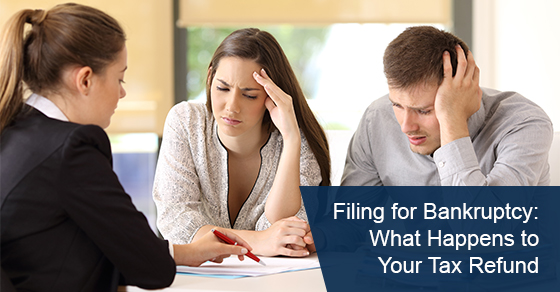First, tax refunds are considered to be an asset. When you file for bankruptcy under the Bankruptcy and Insolvency Act performed by Industry Canada, your trustee will become the administrator of your assets. This means that your income tax refunds for all the years you had not yet received them—until the year of bankruptcy—will also be sent to the trustee to be included in the funds available to the creditors.
After filing for bankruptcy, the law requires that the Canada Revenue Agency (CRA) sends your income tax refunds for the period up to the year of your bankruptcy to the trustee to aid in settling some of the remaining debt. Providing your trustee with your tax information for the year of bankruptcy is necessary to be discharged from bankruptcy.
What is the range for this “specific period”?
When you file for bankruptcy, there are 3 important tax periods that you should consider:
1. The years before filing for bankruptcy
If you have any unfiled tax returns for one or more years prior to the date of bankruptcy or your discharge, your trustee will need to ensure that your tax return is filed. Any refunds will go to your trustee for transfer to creditors. If you owe money on these tax returns, then it will be considered a debt that will be handled regarding personal bankruptcy.
According to Section 67 of the Bankruptcy and Insolvency Act,
“(1) The property of a bankrupt divisible among his creditors shall comprise
(c) all property wherever situated of the bankrupt at the date of the bankruptcy or that may be acquired by or devolve on the bankrupt before their discharge, including any refund owing to the bankrupt under the Income Tax Act in respect of the calendar year—or the fiscal year of the bankrupt if it is different from the calendar year—in which the bankrupt became a bankrupt.”
2. The year when you file for bankruptcy
Section 67 of the Bankruptcy and Insolvency Act above suggests that you will also lose any tax refund for the year that you declare bankruptcy. The CRA will send them to your bankruptcy trustee. If you declare bankruptcy in 2020, your tax refund for the 2020 tax year will be sent to the trustee.
Your trustee will file two tax returns for your bankruptcy year:
- The pre-bankruptcy tax return for that year of the period starting from 1st January to the date of filing for bankruptcy. In case you have income tax debt during this period, it will be included in your bankruptcy because it’s an unsecured debt. Otherwise, any refund will be sent to the trustee.
- The post-bankruptcy tax return for the same year, but starting from the date of filing for bankruptcy to the 31st December. Any income tax owing during this period will have to be paid because it’s not included in the debts when filing for bankruptcy. However, if you get a tax refund, it will be sent to your trustee.
3. The years after filing for bankruptcy
Fortunately, the tax years that come after filing for bankruptcy will not be affected by the bankruptcy. This means that you can collect any tax refunds in subsequent years. Furthermore, if you have income tax debts moving forward, you will also be required to pay them in full.
Exceptions
The Canada Child Benefit (CCB) is a federal, tax-free monthly payment sent out to eligible families with children under 18 years of age to aid them in meeting household costs. The CCB may also include the Child Disability Benefit and other provincial or territorial programs. While the CCB is part of your annual income, it is not considered an asset like a tax refund. So, you will continue to receive them regardless of the bankruptcy.
Filing for bankruptcy will not stop you from receiving your CCB. You should include it when reporting and calculating your household income in the annual tax returns. The monthly reports help determine whether you’re considered as having a surplus income, which will influence the time taken in bankruptcy and the amount you’ll be required to pay to your creditors.
If you don’t want to lose your tax refund, but feel like bankruptcy is the only way to save yourself from a serious financial situation, your financial expert may recommend a consumer proposal.
Filing for bankruptcy: January or December?
Considering that you will lose the tax returns for the year when you file for bankruptcy, does it matter when you go bankrupt?
Generally, since you file your taxes every year, you’re likely to lose your tax refund for one or two years. If you’re expecting to receive a tax refund, you may consider waiting until you’ve filed your tax return and received a refund for the previous year before going bankrupt later in the year. This way, you only lose the tax refund for that year when you’re filing for bankruptcy.
If you’re considering bankruptcy, you’re probably in a very serious financial situation, possibly dealing with wage garnishment and other problems that add to your financial hardship. So you really can’t afford to file for bankruptcy in April or May, not to mention December. However, depending on your situation as to the option that is right for you.
Also, if you owe the CRA some money, then the timing doesn’t matter as they would seize any refunds anyways, thus you can file for bankruptcy anytime.
Final Note
When in financial difficulty and considering bankruptcy, you must consult a professional to assist you in weighing your options and understanding your bankruptcy tax impact. This will help you avoid or manage any challenges or shortcomings you may encounter in the process, even as you rebuild your financial future.
For more information on filing for bankruptcy or a consumer proposal and the implications, please contact Kevin Thatcher & Associates here.

